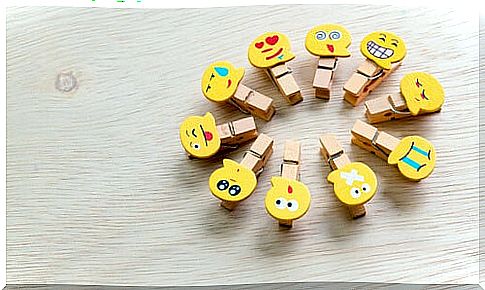Validating Emotions: Building Our Identity

What are we? It is a momentous question and often a frequent one when we find ourselves in specific situations. When we do not know what to decide, when we are faced with a love breakdown or when we have to decide which job to choose. What do all these situations have in common? That emotions play in all of them.
So, very directly, identity and our emotional world are related. Confusion about what we feel often extends doubt to other important issues, such as our ability to control; a control that, on the other hand, we can try to recover by influencing or conditioning others. In this way, we intend to dispel our doubts, verifying that we have the ability to rise above others and, therefore, to influence the course of events.
Our emotions define us
Knowing how to identify, regulate and manage our emotions is a pending subject in education. The importance of this ability is so high that not only our mental health will depend on it, but also that of those who form a life with us.
Let’s think that emotions are a double-sided coin: on the one hand they have energy, on the other hand they have one or more messages. These two faces are just as important and good emotional regulation involves aligning them so that they serve our interests.
Sadness often asks us to reflect and gives us a kind of energy that invites us to pause. Anger often dictates that someone has stepped on our rights, and it provides us with an energy to use the means so that this does not happen again. Now, we are the ones who decide what to do with that message, what sense to give it. We are also the ones who can regulate the release of that energy.

The emotions we experience, depending on external stimuli, are our responsibility, a fact that is not easy to accept, since the tendency to blame others for our anger, our sadness or our melancholy, is common. It is for this reason that the way in which anger is transformed into sadness or fear into joy will define our way of facing daily challenges and the most abysmal problems. It will define us.
Validate emotions
Emotional validation is accepting and accepting as valid what we are feeling or what another person thinks, whether or not we agree with that emotion. Thus, we can validate our emotions and also those of others.
On a theoretical level it may seem like a simple act; however, validating emotions is in the process of extinction. Common complaints such as “he does not listen to me”, “he does not understand me”, “he does not understand me” while the other person denies such statements astonished, since he considers “that he does understand” “he does listen” and “he does understand”, in many cases, they are the consequence of a lack of validation.
The possibility of an emotional validation evaporates due to the need to judge, express an opinion or defend ourselves against an emotion that we do not know. Sometimes, without intent to invalidate the other person, we use responses, non-verbal communication, or justifications that are an obstacle to building empathic bridges. An empathy conducive to the roots of one’s understanding.
What happens when we don’t validate emotionally?
What happens when we do not validate emotionally is similar to what happens when we do not express emotions or deny them. As if we were pressure cookers, we accumulate unorganized emotions until one day they emerge in the form of a lack of self-control.
By validating the emotions of our children, our partners, our relatives or our coworkers, we accompany them and we are present in their discomfort, we make them feel safe, protected, contained, cared for, respected and loved.
- Emotional validation allows, without judgment, to accept what happens to the other and let him change negative emotions for positive emotions.
- Emotional invalidation is the opposite. It is an indirect rejection of the other person’s feelings. A denial of what you are feeling that results in a lack of understanding and listening.
Emotional invalidation and identity theft
Not emotionally validating what the other is feeling can be a reason that chills the bond and the relationship. As we mentioned at the beginning of the article, emotions not only define us, but also guide us towards certain options, lifestyles, behaviors and other paths that make us unique -as well as recognizable-, thus marking part of our identity. and self-control.
On the contrary, that others do not validate our emotions can sow in us the idea that we do not fit in, that there is something dark inside us that makes us fragile, unpredictable and unreliable. Thus, if we feed and water this seed, if we copy the position of others before our emotions, it is easy that we end up losing the idea of who we are along the way; while the future becomes overwhelming for not knowing how to answer the question of who we want to be.
It is of great relevance to validate emotions during childhood, since the unconditional acceptance of the emotions of the little ones will facilitate their expression, identification and emotional management. If, on the other hand, for fear of the sadness that a child may feel, he avoids with hints, with double messages or with solutions, we will be emotionally invalidating him and therefore, we will generate high doses of anxiety, irritability, nervousness and insecurity.

The art of knowing how to validate emotions
There are some points that can help us when doing an emotional validation:
- Active listening or mindfulness.
- Welcoming and empathetic body position.
- Normalize emotions.
- Avoid giving solutions to emotions.
- Avoid justifying yourself or defending yourself against them.
- Avoid them with humor.
- Keep an open mind without judging.
Some examples of emotional validation and invalidation that we can offer for a better understanding to the reader are:
Emotional invalidation
Maria: I have not been able to finish the task and I am very frustrated
Laura: you will finish it tomorrow, calm down
María: now, but I’m doing everything very badly
Laura: It’s not the end of the world, Maria
María: I think so, I wish you could have helped me
Laura: I’ve had to do a lot of things today huh
Emotional validation
Maria: I have not been able to finish the task and I am very frustrated
Laura: OK, normal, it must be annoying to leave her half, right?
Maria: yes, a lot. I think I’m doing everything very wrong
Laura: yes? this is how you feel
Maria: the truth is yes. I wish you could have helped me
Laura: it’s true, you would have done well. I would have loved to be able to give you a hand. Too bad I’ve had a day full of things.
Validating emotions is an art worth learning to improve humanity and empathy within human relationships, to help the youngest grow up without feeling terror towards the emotional world, and thus we can name emotions without being unexplored territory . Together, let’s make “putting yourself in the shoes of the other” a much more humane, close and generous result.









